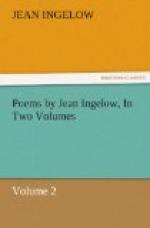There is a happiness in past regret;
And echoes of the harshest sound are sweet.
The mother’s soul was struck with grief, and
yet,
Repeated in her child, ’twas not
unmeet
That echo-like the grief a tone should take
Painless, but ever pensive for her sake.
For her dear sake, whose patient soul was linked
By ties so many to the babe unborn;
Whose hope, by slow degrees become extinct,
For evermore had left her child forlorn,
Yet left no consciousness of want or woe,
Nor wonder vague that these things should be so.
Truly her joys were limited and few,
But they sufficed a life to satisfy,
That neither fret nor dim foreboding knew,
But breathed the air in a great harmony
With its own place and part, and was at one
With all it knew of earth and moon and sun.
For all of them were worked into the dream,—
The husky sighs of wheat-fields in it
wrought;
All the land-miles belonged to it; the stream
That fed the Mere ran through it like
a thought.
It was a passion of peace, and loved to wait
’Neath boughs with fair green light illuminate.
To wait with her alone; always alone:
For any that drew near she heeded not,
Wanting them little as the lily grown
Apart from others in a shady plot,
Wants fellow-lilies of like fair degree,
In her still glen to bear her company.
Always alone: and yet, there was a child
Who loved this child, and, from his turret
towers,
Across the lea would roam to where, in-isled
And fenced in rapturous silence, went
her hours,
And, with slow footsteps drawn anear the place
Where mute she sat, would ponder on her face,
And wonder at her with a childish awe,
And come again to look, and yet again,
Till the sweet rippling of the Mere would draw
His longing to itself; while in her train
The water-hen, come forth, would bring her brood
From slumbering in the rushy solitude;
Or to their young would curlews call and clang
Their homeless young that down the furrows
creep;
Or the wind-hover in the blue would hang,
Still as a rock set in the watery deep.
Then from her presence he would break away,
Unmarked, ungreeted yet, from day to day.
But older grown, the Mere he haunted yet,
And a strange joy from its sweet wildness
caught;
Whilst careless sat alone maid Margaret,
And “shut the gates” of silence
on her thought,
All through spring mornings gemmed with melted rime,
All through hay-harvest and through gleaning time.
O pleasure for itself that boyhood makes,
O happiness to roam the sighing shore,
Plough up with elfin craft the water-flakes,
And track the nested rail with cautious
oar;
Then floating lie and look with wonder new
Straight up in the great dome of light and blue.
O pleasure! yet they took him from the wold,
The reedy Mere, and all his pastime there,
The place where he was born, and would grow old
If God his life so many years should spare;
From the loved haunts of childhood and the plain
And pasture-lands of his own broad domain.




